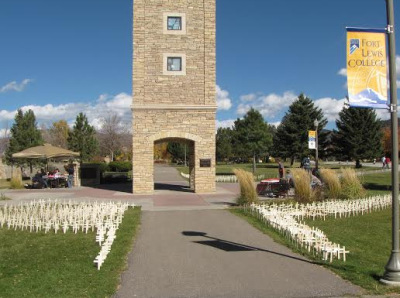Crosses represent starving children in project to end world hunger

BAYFIELD, Colo. (Christian Examiner) -- About 5,000 crosses stand sentinel at various times during the year in southwestern Colorado.
Each cross – constructed of 12-inch paint stir sticks stapled together and painted white – represents one child. They are the first of 19,000 crosses that together represent the 19,000 children a day who worldwide die from hunger and other effects of poverty.
"What we're trying to do first and foremost is raise money so kids don't die," said Gordon Herrick, a member of First Baptist Church of Bayfield, math instructor at Fort Lewis College in Durango and organizer of what is known as The Crosses Project. "We're trying to put food in starving kids' mouths.
"The blind spot of the church today is the enormous number of children across the world who are dying each day from hunger and the effects of poverty," continued Herrick, adding that his conscience had been pricked after leading a study of the book Radical by David Platt. "You develop a heart like the Lord. ... We're all called to do what we can."
Two years ago, Herrick approached Randy Ash, pastor of First Bayfield, about his belief that if people truly understood the fact that 19,000 children die every day from poverty-related causes, they would give to Global Hunger Relief – www.globalhungerrelief.com – or another organization that tackles hunger-related issues.

Global Hunger Relief, a ministry affiliated with Baptist Global Response, is able to send 100 percent of the hunger relief funds it receives to places in need – 80 percent internationally; 20 percent in the U.S.A. – because its administrative costs are covered by the parent organization.
"It only takes $1 to feed a child for a day," Herrick wrote on Facebook.com/crossesproject. "It is estimated that if the contributions to combat world poverty were to increase by just 10 percent of their present levels, the problem could be eradicated in 10 years."
His idea was to turn paint stir sticks into crosses painted white, which would be temporarily "planted" in visible places around southwestern Colorado, to let people see just how many 19,000 is.
"The Lord laid it on my heart to demonstrate this enormous problem that's totally preventable," Herrick said in a recent telephone conversation. "We didn't want to put a guilt trip on people, but to get them to think about what they could do."
Herrick gathered a group of about 10 people from the church. Together they can make about 750 crosses during a 90-minute, once-a-month, Saturday "project day."
The group's goal is to make 19,000 crosses and place them for a month at a time at various locations across southwestern Colorado, so people can better grasp the enormity of 19,000, the number of children who each day die from hunger and other poverty-related causes.
With a local hardware store – Lewis Mercantile – matching one-for-one the cost of what technically are known as "paint paddles," First Bayfield can get 500 for about $30. Herrick estimated the total cost of stapling one-half of a paint stir stick horizontally to a full-length vertical stick and painting one side of the cross white, to be about $3,000 for 19,000 crosses.
However, he learned from experience that the crosses that gleam so brightly at first in contrast to the surrounding ground, lose their visibility as they become weathered, and have to continually be replaced.
Another problem is manpower. It's back-breaking work even with crowbars beating holes in the ground to plant several thousand crosses at a time. A three-hour workday is about all an adult past the flexibility of youth can endure, Herrick said.
"We do what we can," Herrick said. "We feel we're being obedient to what we're called to do. The Lord can use this to whatever degree He sees fit.
"Thirty years ago, 43,000 children died each day from hunger and poverty," Herrick said, quoting, he explained, statistics from the relief organization Compassion International. "Now we have it down to 19,000.
"We believe that's still too big a number and hope we can reduce that to zero within the next 10 years," Herrick continued. "If we can realize 10 percent more contributions over the next 10 years, the death of all these children can be completely eradicated."
The first display of the crosses was in July 2013, at the city-owned ski slope not far from downtown Durango, some 15 miles west of Bayfield. In October 2013, the crosses were "planted" at Fort Lewis College in cooperation with Master Plan Ministries, a student organization.
"We are committed to praying over each cross individually," Herrick said. "We really actually think that might be the most important part, for God's people to be praying God's heart. We believe it sets that cross apart and represents a child that day. It's sanctification for a special cause. That's our agenda."
At Easter the crosses were displayed on the lawn at First Bayfield, located at a main intersection – Bayfield Parkway and Buck Highway – in the town of about 1,600. This summer they were planted in a quarter-acre section of the pastor's property, which is on highway frontage just inside the Durango city limits. This fall they are again to be set up at the church's property.
Mission teams looking for a week-end project are invited to participate in First Bayfield's "planting parties." Contact Herrick at Facebook.com/CrossesProject or the church at fbcbayfield@qwestoffice.net.
"One of the spinoff benefits is non-Christians seeing people doing something Christ-like," Herrick said. "We're serious Christians. We're not just in it [church] only until it costs us something."